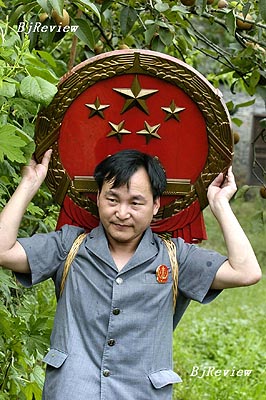
Security Checks
The Standing Committee of the National People's Congress (NPC), China's top legislature, has adopted an anti-monopoly law that requires foreign purchases of Chinese companies to go through national security checks.
The law, which has been 13 years in the making, will come into effect on August 1, 2008.
"As well as anti-monopoly checks stipulated by this law, foreign mergers and acquisitions of domestic companies or foreign capital investing in domestic companies' operations in other forms should go through national security checks according to relevant laws and regulations if the cases are related to the issue," it reads.
Foreign companies have begun to acquire major state-owned enterprises or companies with famous brands in recent years, arousing concerns about China's economic security.
Eliminating Tobacco Promotion
China, the world's largest tobacco producer and consumer, will ban all forms of tobacco promotion by January 2011, in a bid to fulfill its obligations to the World Health Organization Framework Convention on Tobacco Control, which China formally joined last January.
A ban on direct tobacco advertising has been in place since 1996, but firms have managed to sidestep the rules and promote their brands in other more subtle ways such as sponsoring sporting events, or using their logos without mentioning "cigarettes" on television, radio and in newspapers and magazines.
Xu Guihua, Vice President of China Tobacco Control Association, made the announcement on August 27 at a seminar in Guangzhou, capital of Guangdong Province. Xu said the nation lags behind other countries in efforts to control the use of tobacco, and the biggest problem is a lack of national regulations banning smoking in public areas.
Legal Solution to Water Pollution
Limits will be lifted on fines for firms that dump waste into water, according to a recent legislative amendment. The current cap on fines for water polluters is 1 million yuan ($132,000) besides administrative and legal penalties-which is not considered deterrent enough.
The draft amendment to the water pollution prevention and control law, which came into effect in 1996, proposed fines that range from 20 percent to 30 percent of direct economic loss caused by polluters.
People involved in major water pollution accidents also face prosecution, according to the draft law, which has been submitted for review to the Standing Committee of the National People's Congress, the nation's top legislature.
Harsher Fines for Price Manipulation
Mounting inflationary pressure and public concerns about further price rises have led the government to wage tougher punishments against price manipulation.
The National Development and Reform Commission (NDRC), China's top economic planning body, said a revised regulation against price irregularities, including higher penalties for market price manipulation by industrial associations, is ready for approval by the State Council.
"To punish such wrongdoings, we plan to increase the fine," said Zhang Manying, Deputy Director of the Pricing Supervision Department of NDRC during an online discussion. But Zhang didn't reveal the penalty ceiling in the revised regulation. Currently, the maximum fine is 300,000 yuan in a single case.
Product Quality Measures
The Chinese Government took a series of measures in August to ensure food security and reliability of Chinese products, said Li Changjiang, head of the General Administration of Quality Supervision, Inspection and Quarantine.
The State Council, China's cabinet, has promulgated regulations on supervision over product quality and food safety. It also issued a circular that stipulated manufacturers should take the primary responsibility for ensuring product quality and food safety.
On August 17, the State Council issued a white paper on food safety with a pledge to prevent the export of substandard food. It has established a national leading group headed by Vice Premier Wu Yi to address product quality and safety issues. Late in August, the government started a four-month nationwide campaign to improve the quality of goods and food safety. | 